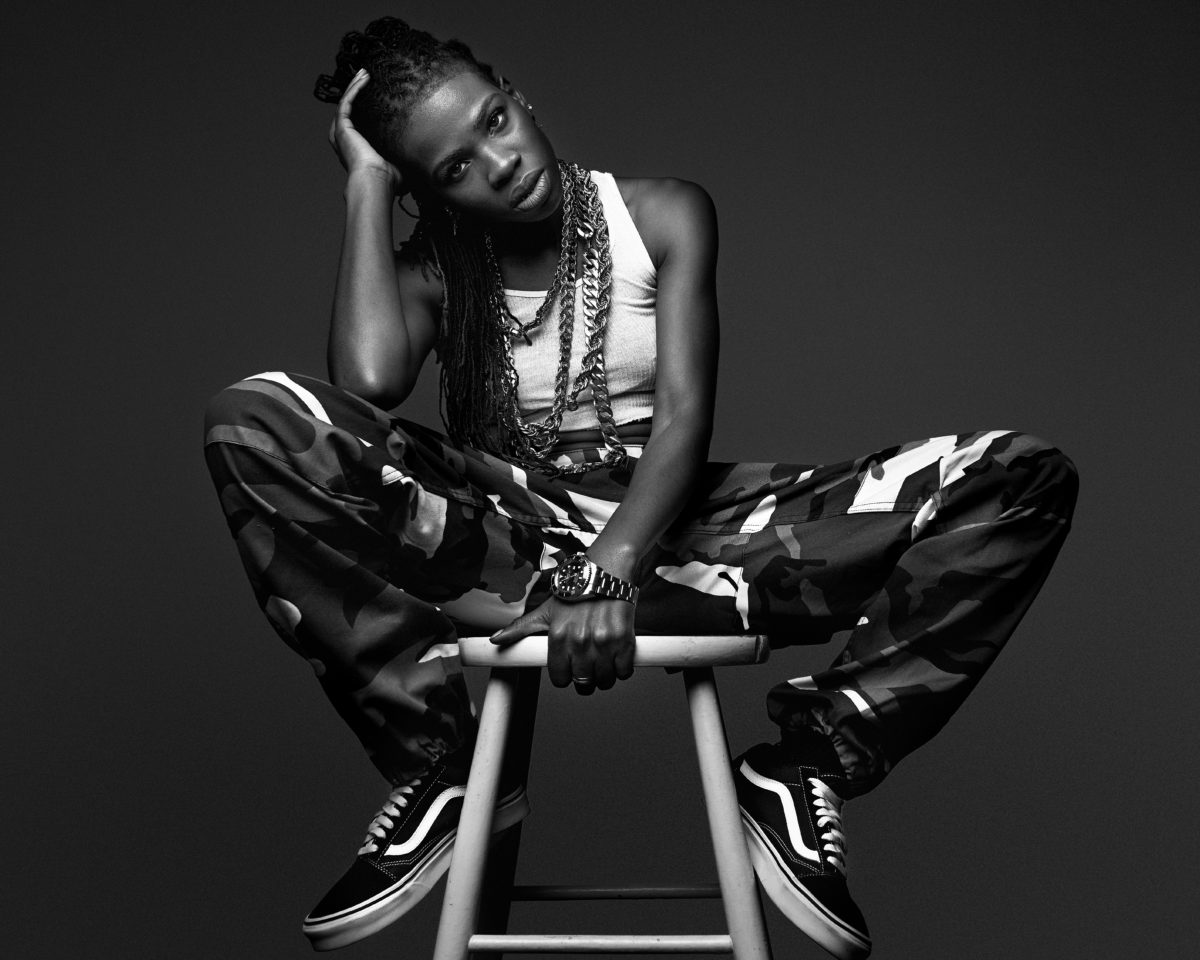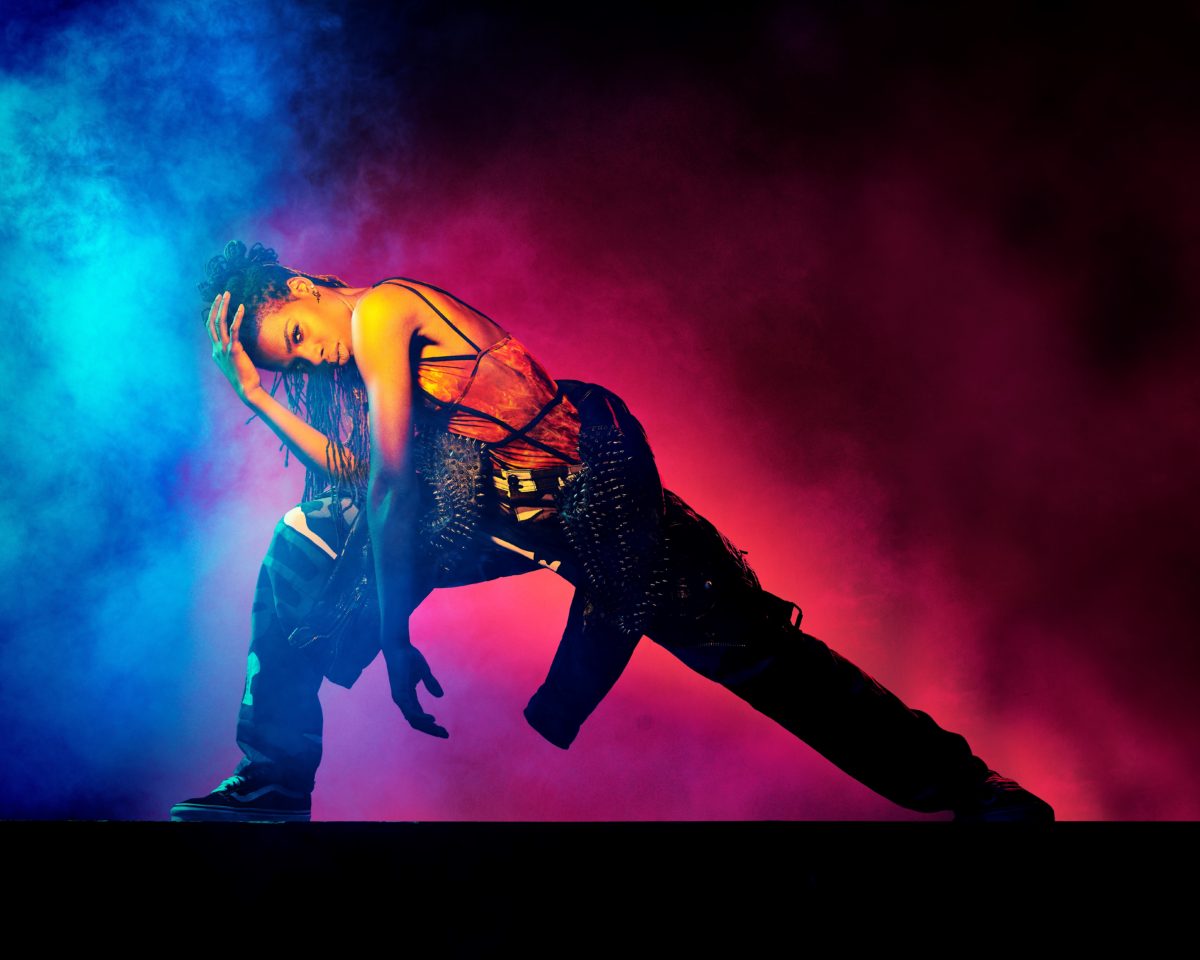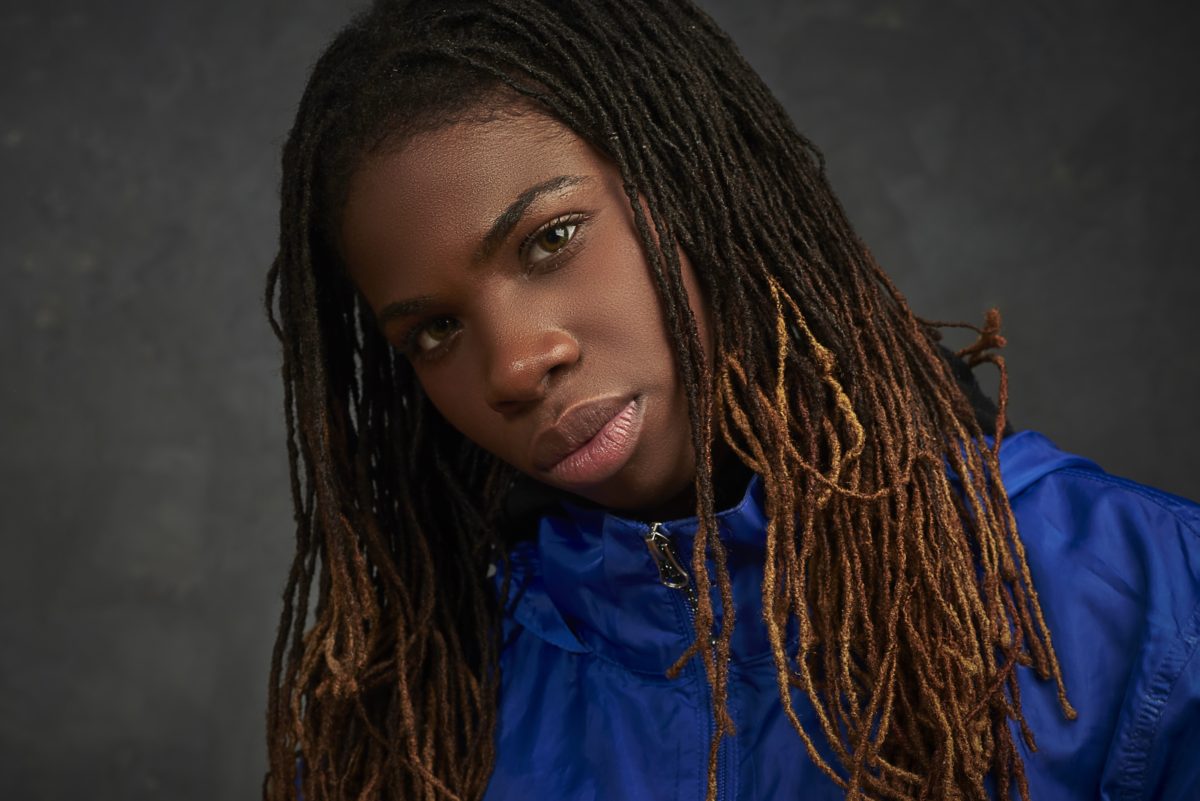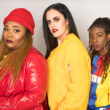Daring. Bold. Outspoken.
From spitting a defiant feminist empowerment manifesto on “In Women Colour,” to addressing America’s prolonged history of racism and slavery on “Thirteen” — a track she wrote before she saw Ava Duvernay’s 13th documentary — Haviah Mighty opens up to listeners using personal experiences and historical moments. She conveys powerful messages encouraging others who have been oppressed to channel their strength by using their voices to speak out.
A native of the Greater Toronto Area’s Brampton, Haviah was recently named the winner of the prestigious 2019 Polaris Music Prize — an annual music award awarded to the best full-length Canadian album based on artistic merit.
The outspoken emcee was nominated for her debut full-length album 13th Floor, released earlier this year. The 13-track album, which she co-executive produced alongside A Tribe Called Red’s 2oolman, focuses heavily on marginalization, racism and feminism. It’s the follow-up to her acclaimed 2017 EP, Flower City, and features collaborations with Sean Leon, Clairmont the Second and Haviah’s sister, Omega Mighty.
Haviah’s been releasing music independently since 2009. In recent years, in addition to gaining many accolades for her personal work, she has also become well known for her work as a member of the hip-hop trio The Sorority – formed at an International Women’s Day event after members Haviah, Keysha Freshh and Lex Leosis performed in an all-female cypher that went viral.
13th Floor highlights Haviah’s sonic influences and acts as a perfect medium for her to exemplify some of her more lyrically conceptual materials in a reflective and fluid manner, while still delivering her fans with the signature rough and tumble gritty, je ne sais quoi they have come to love.
I know you’ve been releasing music since 2009. When did you decide you were going to pursue music professionally as a full-fledged career?
I think I truly made the decision in 2016. I participated in a rap cypher video and I got a lot of views, over 2 million views. For me that was the first of anything going somewhat viral. I just think that the potential of what music can do became more apparent to me at that time.
You’re a woman of colour in an overwhelmingly, unfortunately, male-dominated industry and your music tackles this reality. What is an example of a challenge you face as a Black woman in this industry and how were you able to navigate that challenge?
Sometimes it’s not as cut and dry as that because, I mean, you know what the reasons for something is, but it’s not necessarily vocalized.
I know that growing up something that was vocal, outside of the auditions that literally said, ‘no African American women should audition for this role,’ which I grew up seeing that a lot, I faced knowing that I didn’t get a role or a part because I didn’t look the part, because my skin tone didn’t match the part and it wasn’t said in so many words, but it was quite clear.
You also just get comments from certain people. When you get an opportunity to do something you’ve worked so hard to do and you already feel like you have been ready for this opportunity a long time ago. But you just get this opportunity and maybe because some people were unwilling to unlock the door and then when that door is finally unlocked, people remind you that you are outside of their expectations but they were wowed by whatever it is that you did because you exceeded their expectations.
I think sometimes that is based on [gender] and sometimes that’s based on race. I noticed that a lot, in like working in any sort of customer service job, the way they would be surprised by my dialect or my ability to service their needs or whatever it is. And just like the shock at how well-spoken I might be … Generally, for that, it’s because I’m Black and not because I’m female.
On the other side, because I’m female some people will straight up refuse your services because they don’t think that you’re going to be capable of servicing them. For me, I experienced that a lot when I worked in the technical aspect of music at Long and McQuade working in the rental department and renting speakers and programming lights and stuff like that.
I’ve had male customers either tell me how shocked they were that I was able to help them or tell me that they would like someone else to help them or literally just assume I’m a receptionist.

It just feels amazing that my first major album is getting this kind of notoriety.
When you found out about being shortlisted for the Polaris Prize* how did you feel and what did that moment mean to you as an artist especially that this is your first major album?
It just feels amazing that my first, as you say, major album, the one that people recognize me for, is getting this kind of notoriety.
Shocking in a way, but it’s a beautiful thing too. I mean, this is the first year that hip-hop is really being represented. It’s the first time that so many women are being represented as well and so to just be acknowledged amongst these nine other great albums, you know, at one time it was 39 other great albums and to be a part of the top 10 over something that acknowledges albums in Canada based on their artistic merits specifically, which is my goal as an artist.
My focus is artistic merit and the messages are a part of that of course, but I’m a musician at heart and I just really want to make great music that people can enjoy.
It just feels like I’ve been somewhat successful in the goals that we set with this record and what we intended for it to do, and what I intended for it to do because of how important these messages are to me.
I just think back to a time when I was in high school and I was talking verbally, not like singing or anything, but just in the hallway talking to other kids about these opinions that I have, which are very much based on my growth and my understanding of the world. It’s the same type of thing that I touch on this album and other kids, the way that they would dismiss the topic or just not be willing to go into that level of depth because we’re at school or whatever it is, left me feeling somewhat alienated. These really strong opinions that I feel I had, people that didn’t really have time for it and now not only do they have time for it, but it’s being acknowledged through an artistic merit, but also for the messages. It’s just, it’s a crazy circle.
You tackle a lot on this album. What was the writing and recording process like? Were there any memorable moments for you?
It was cool. I think it was just for me, a lot of firsts. Like, I’m used to recording myself and doing everything with not a lot of input. It was like a studio that wasn’t my own with 2oolman from A Tribe Called Red and we spent a lot of time in the studio just talking about stuff.
It wasn’t even anything specific to the album. We were just talking about stuff and I think some of the greatest moments of being in a studio and talking led to me pulling on my deepest depths.
I was able to take the lead in every way to really help the album be what I wanted it to be and what I wanted it to sound like.
Collaborations were cool moments. Having Clairmont The Second come to the studio was a great moment. And also having Sean Leon come to the studio and record as well. Those were great days and just great feelings. I’m not used to doing that. I hadn’t collaborated with a lot of people in a lot of my previous work and whenever I have it was done remotely. I’m in my studio and they are at their studio. So, to have somebody come to the studio to really bridge the minds and kind of truly collaborate, those were really fun moments as well. Very memorable moments for the creation process.
I just think I did too many things for the first time with 13th Floor. I took a lot of risks and with risk comes reward is what they say because there’s been a lot of reward as well. I’m just blown away by what it’s been able to do so far.
What has the reception been like since the release? What feedback has really touched you?
The feedback has been great. Overall the feedback has been amazing. It’s something I’m not used to but I’m so touched that people take the time to reach out or even at a show, they take the time to walk over to you and let you know that they really enjoyed your set.
I think what touches me the most is when the songs like “Thirteen” or “In Women Colour”, when people tell me a thought based on those two songs, it’s usually something deep. Generally, a lot of people tell me that “Thirteen” brings them to tears and you know, maybe they didn’t realize the magnitude of the history behind the song “Thirteen” until hearing that song. “In Women Colour”, I find I receive a lot of personal experiences and generally it’s particularly Black women telling me that they took something from the song.
When someone tells me that they took something on the song and they can reflect on a part of their past or a time in their past, when the observation was occurring, like when they were being impacted negatively or harmed negatively because of the themes that are in “In Women Colour” as a dark-skinned, Black female, that’s really impactful for me.
It reminds me how important it is for me to do what I’m doing and say what I’m saying for the people that need to hear, or desire to hear, or are reminded when they hear that they are great. I was just listening to Beyoncé’s album too because she has that song, “Brown Skin Girl” and it’s crazy. First of all, just like a nice song sonically and it sounds really good.
It’s nice that she has her daughter singing on the record, but when we listen to the theme of it and the lyrics in it, just the fact that we even need to say the things that she’s saying on records should tell us how much of a problem we have on our hands.
The fact that we need our own songs to remind one type of girl what they are worth, I just don’t know how we ended up here. I grew up in a household where I was reminded of my worth and my value constantly and I know that not everybody has that so the same things I was lucky enough to receive that I know are so instrumental to the person I am today, are some of the things I put in my own music. It gratifies me for sure when someone reaches out and lets me know that they needed it and it makes me feel like I could never stop.

I don’t like the crabs in the bucket mentality. I don’t subscribe to it. If I feel it, I will distance myself.
Many have described “In Women Colour” as a feminist manifesto that in many ways sets the tone for the remainder of the album. How do you feel about that description and what was your thought process in producing such a blunt piece that really touches on gender and racial inequality along with a host of other sociopolitical issues?
I would agree with that statement. I’ve done a lot of shying away from those topics though and I think, maybe, it was just time.
I was in the studio with, you know, many different people who are really interested in my truth and I shied away from telling it for a long time and the time that I did tell it, I’ve received a lot of flak for it, whether it was in school as I said, or at work or whatever. It felt like the best medium to do it, you know, over a hard-hitting beat that I made with another woman of colour who has experienced it.
When we worked on “In Women Colour” we were in the studio and we were just talking about things we’ve experienced in the studio or in the industry and different realms. And a lot of our experiences were the same I think because we’re both Black women and I feel like that commonization that we had that’s about some of the struggles and issues that we have navigating within the industry, it set the tone for that to be the theme already.
And then my natural thoughts, you know, I started thinking if I wasn’t a rapper and if my identity wasn’t to be literally a character, like the things that people say about me, they would continue to say, and the things that people don’t say about me now, they only don’t say it because I’m a character that they’re willing to buy into.
Right before I was that character I was all of these negative things that people will call me if they don’t know who I am personally. Some people may say I’m obnoxious, I am exuberant, I have a lot of energy. I give a lot of energy off and that was always a problem growing up. It’s really an issue for teachers. It was always indicating something further like anger management or ADHD or some sort of pharmaceutical-drug-needing issue. It always was not a positive and all of a sudden now it is.
… That song is kind of me triumphing those things as well and learning to love myself despite. It’s something you have to continually remind yourself; it’s almost like a monologue. That’s something that I feel you have to do on a daily. You have to remind yourself that you’re great.
You tend to work with a lot of artists in the city and some up and comers. Some local artists have described the collaborative climate within Toronto using terms like ‘rat race’ or ‘crabs in a bucket.’ From your experience, where do you think Toronto is in terms of artists collaborating with each other and industry support?
I can’t really compare it to anything, but I think you get an amalgamation of everything. You get a lot of people that do support, and they do want to see you grow and then you do get crabs in a bucket mentality from some or they’re like, I’m on, you’re not, so I can’t acknowledge you in public.
You get all sorts of different types of energies … I think the main thing that I try to remind myself always is to remain humble. For me personally, remaining humble makes everything else fall into place because it means that you genuinely can never get to a point where you think you’re better than somebody because you always think about the way that you can grow and you always think about the new opportunities you can explore.
You’re just always looking for growth and expansion. I always say I’m a Sagittarius, that’s my main thing. I just always strive to expand and be better and grow and I just know that all the bricks can always fall, and you can rebuild them, and things can just change at the drop of a dime. Those things keep me humble and keep me just wanting to learn and grow.
So, for myself that’s how I feel it is best to navigate. So, I don’t like the crabs in the bucket mentality. I don’t subscribe to it. If I feel it, I will distance myself. I do think in the Toronto industry, you feel a little bit of everything. You feel hardcore love from a lot of people and fans that are so gratified by your messages. Then you do feel from other people, whether they’re musicians or fans, you do feel that opposition. For me, I just don’t think it’s a Toronto thing. I think in any industry you’ll feel that. As you work your way up, there will always be people that are threatened by that and that’s where you’ll probably get that; they’ll be those more so negative feelings and opinions and sentiments.
I’ve been in singing lessons since I was four. All my sisters create music. It’s really the thing that I eat and breathe and this for me is not like a clout thing or popularity contest. So, when I do feel those energies, it’s just very easy to distance myself. I like to be cognizant of feeling that because I just don’t want anything to do with it.
On a lighter note, your musical journey has led you down many paths, one of which includes your single “Vamonos” being featured, on HBO’s hit show “Insecure” featuring actor, comedian and activist Issa Rae. How was that moment for you?
It was incredible. I remember when I was doing it and I just thought that there’s no way, but I strive to this opportunity and then I found out months later that the song landed and I was just so grateful. I remember being a young kid and trying to get placements and never, ever, ever, ever hearing anything back ever. And it was just cool. “Vamonos” is a fun track, “Insecure” is an amazing show, Issa Rae is an incredible actress, just incredible in general.
Music has created opportunities for me I’ve never had, paycheques I’ve never seen, traveling I have never experienced, expertise and perspective I’ve never explored before.
If you could pick one show to feature a song from 13th Floor, which show would it be and what song would you choose?
I just watched that documentary 13th and I really feel like “Thirteen” is that song. It’s like the same storyline. When I watched it, I was kind of like, wow I’m shocked that the information that I got didn’t come from the documentary because it’s a lot of the same information. Just obviously the documentary is more in depth than the song is. I just watched it like a few weeks ago and I was like, wow I learned all of this through YouTube, that’s crazy. I feel like the song “Thirteen” would be a good accompaniment to the documentary 13th.
As far as future plans for yourself, where do you see your music 10 years down the line? How do you hope your music will impact future generations?
Ten years from now I want my music to have its own legs to stand on, but I don’t know in what capacity that will happen. I’m open to it happening in many different ways. I don’t have a set goal on a specific way that has to happen. I am already in a position where I’m able to do music full time, that was always a goal of mine. If it can secure a lifestyle for me that allows me to take it a step further and focus on things that I want to do that are not specifically music. If the music can create that avenue for me, I think that would be great.
I’m a musician at heart. I will never not make music, but I also learned a lot growing up. I’m learning more now and I’m sure I’ll learn even more later of the way that you can help and impact different communities. Oftentimes you just need to have the luxury of the time and the energy and the money and financial resources to do certain things. Music has created opportunities for me I’ve never had, paycheques I’ve never seen, traveling I have never experienced, expertise and perspective I’ve never explored before. It opens the realm for so much life understanding.
It’s hard to say in 10 years where I’ll be, I don’t know, but I know that I want to have a positive influence on whomever and whatever I associate myself with. … Even technology could change. So much can change and what I may be doing in 10 years might be something that doesn’t even exist today. I do know that I want music to be the beacon that allows me to go further and whatever it is, I want it to be positive and for the people.
*This interview was conducted prior to Haviah Mighty winning the Polaris Music Prize. She was on the shortlist at the time.
Main Feature Photo © Isa Miguel Ransome & Urbanology Magazine
Additional Photos © Matt Barnes




Comments are closed.